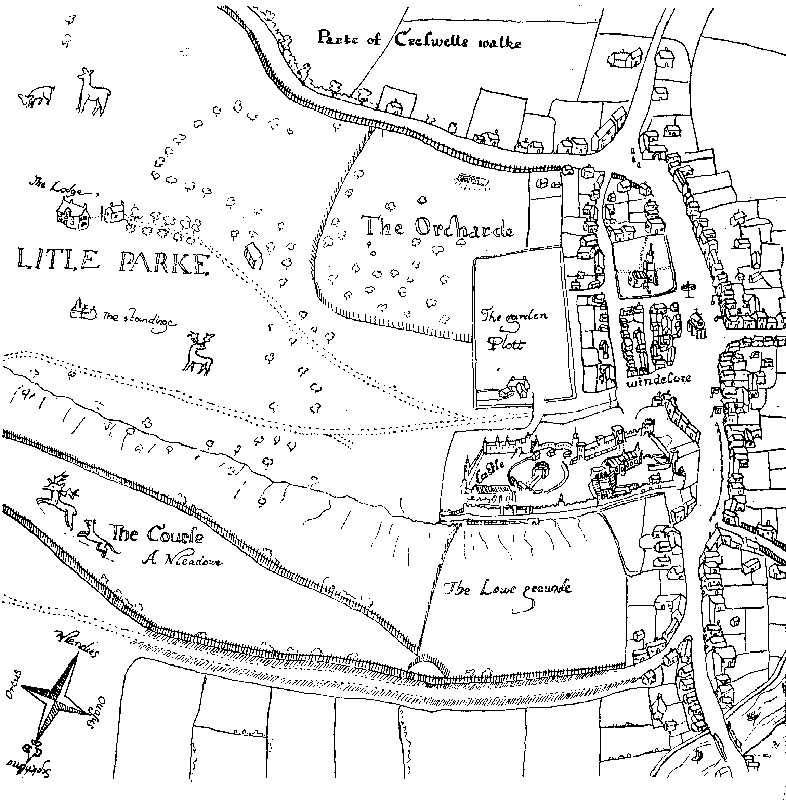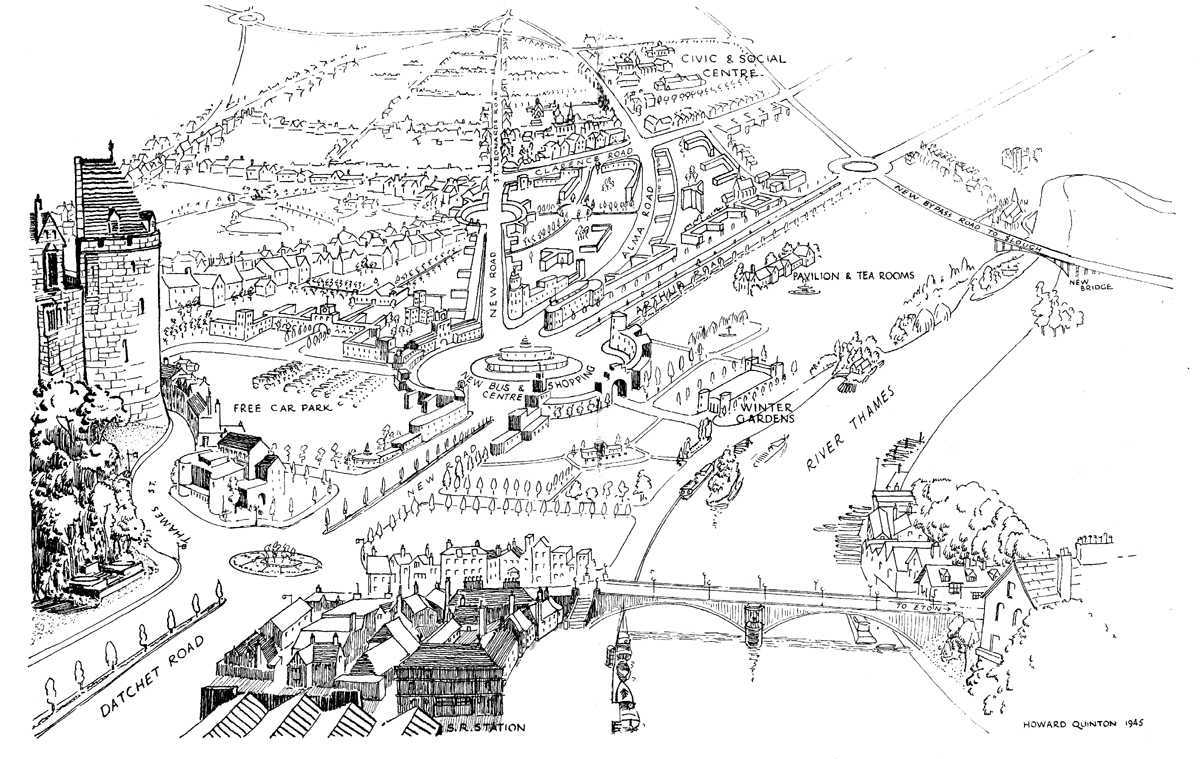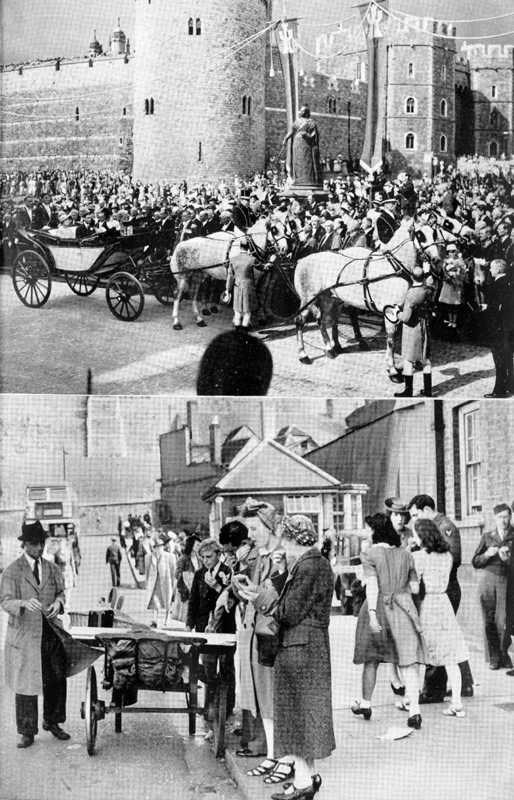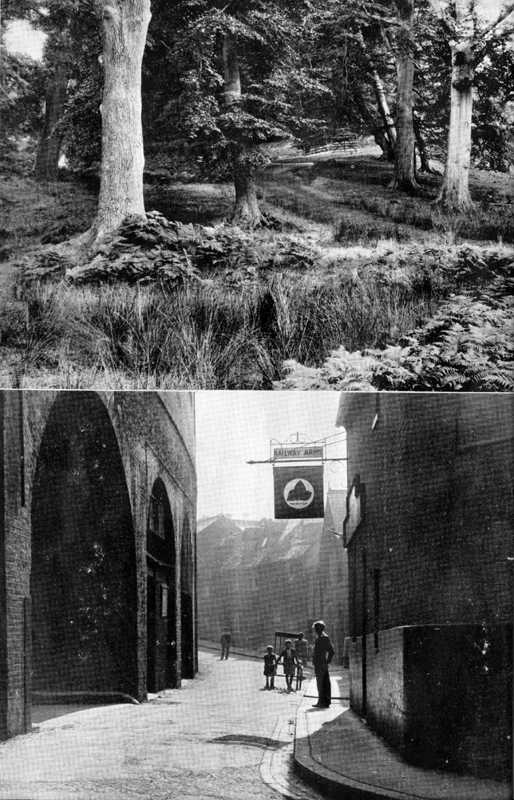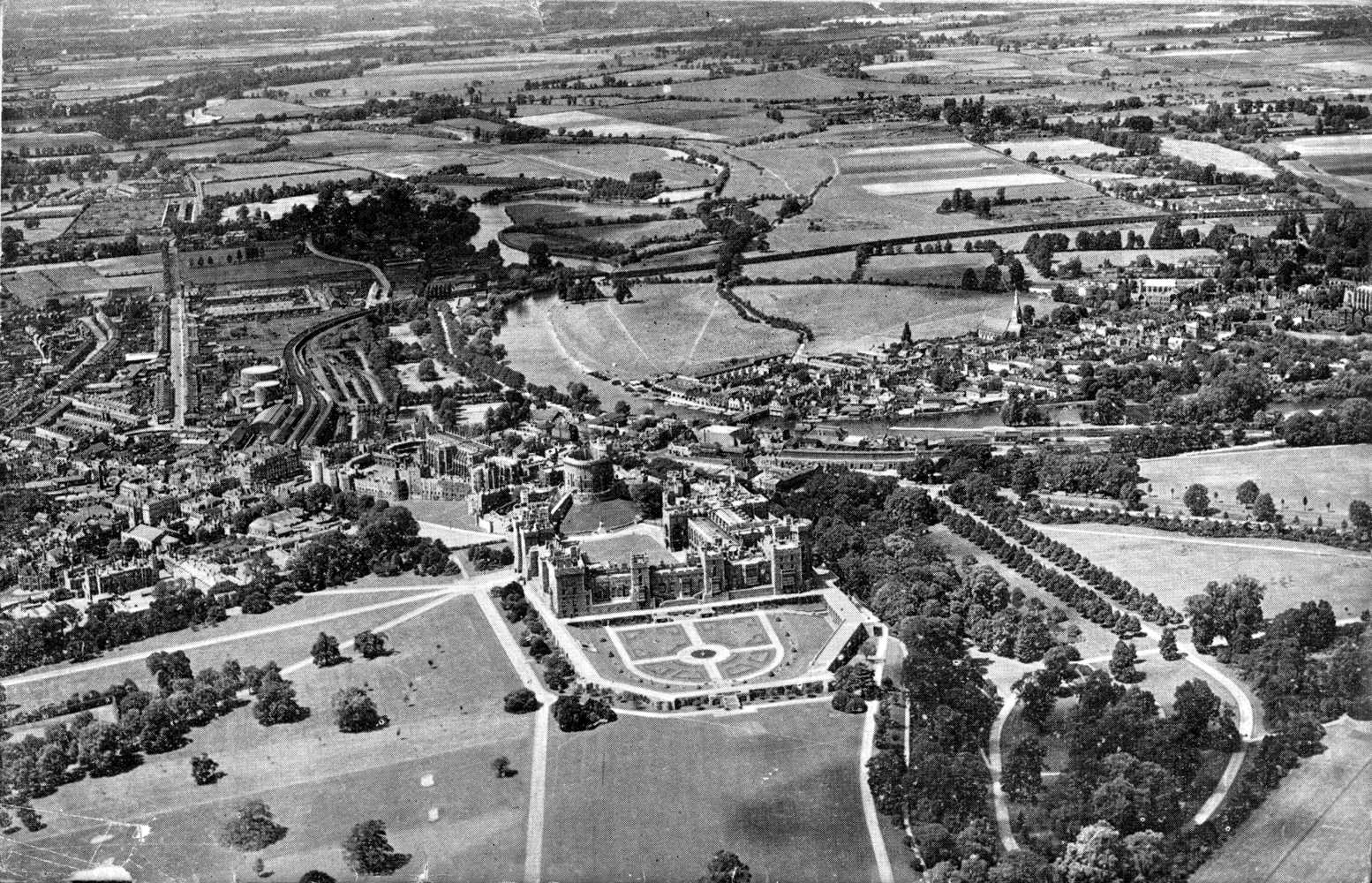
|
The following was published by the Windsor Labour Party in the autumn of 1945. Earlier in the year the Labour Party nationally had won the General Election, defeating Winston Churchill. Now the local Labour Party wanted to take control of Windsor Council in the local elections of November 1945. just months after the end of the war. The Borough of Windsor and Maidenhead was some 30 years away at that time. The text of their booklet 'Your Windsor' has been electronically scanned and checked but it may be that errors have crept in. Do please advise the editor if you identify anything that should be corrected. To contact us, please email Thamesweb Editor. |
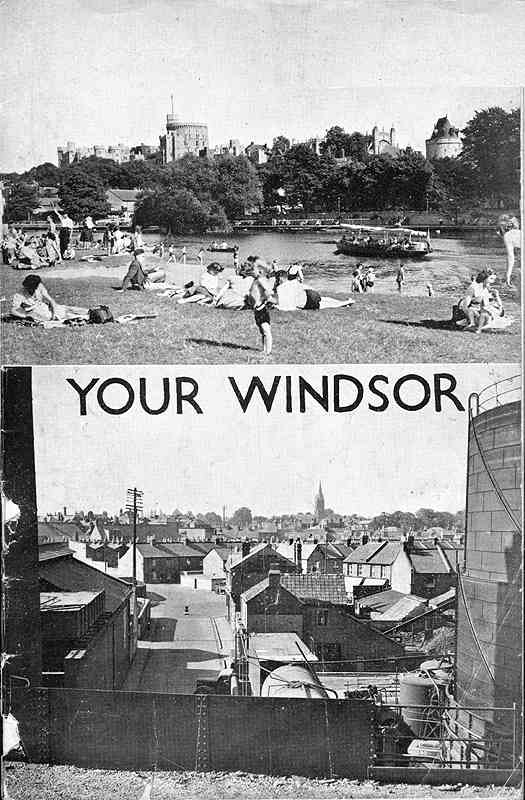
A postcard view of the river and Castle, and the 'Gasworks View'
as seen from the G.W.R. Station.
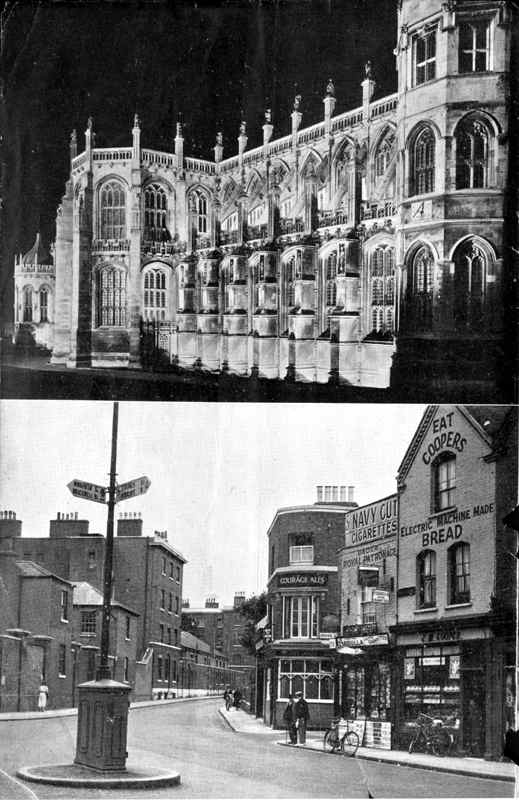
ORDER AND DISORDER
The magnificence of St. George's chapel seen in flood-light,
compared with the architectural squalor of Sheet Street, with the ugly barracks on the left.
Contents
FOREWORD
SHOULD THERE BE PARTY POLITICS IN THE TOWN COUNCIL?
HOUSING AND PLANNING
Housing. The Past
What the Labour Party would do
Planning
Two Windsors
Other necessary developments
The need for controlsCIVIC AND SOCIAL CENTRES
The Imperial Service College
The College and a Civic Centre
A Social Centre
Who Pays?PUBLIC SERVICES
Waterworks
Transport, Gas, Electricity
Street lighting, and Refuse Collection, Sewerage, Libraries
Pleasure grounds and Baths
AllotmentsHEALTH
Present Services
Chaos of Administration
What will the Labour Party do?
A comprehensive Health ServiceEDUCATION
Are you satisfied with Windsor's Schools?
An Educational Plan for WindsorBUT WHAT IS IT GOING TO COST?
"Keep the rates down ! " The Facts
What the Conservatives really meanCONCLUSION
ACKNOWLEDGMENTS
PRICE SIXPENCE
FOREWORD
WHAT DO YOU think of Windsor? Is it all it might and should be? If not, what is wrong? And where is it wrong? And what should be done to put it right? And how can it be put right?
Consider Windsor. Most of it is built in the ugliest style of the Victorian age, when the houses of the rich were too large and fanciful and the houses of the poor too small and dingy. Apart from one or two buildings there is nothing of which anyone can justifiably feel proud.
The war has not improved
things. Repairs have been negligible; and billeting and overcrowding
have made the whole problem of housing in Windsor one which the
sternest measures are needed to solve. If a large part of the
town is to be anything but a disgusting slum, something drastic
has to be done as soon as possible. The Castle is beautiful of
course; but the town which has grown up through the centuries
at its side is by now no fit place for serving men and women
to return to.
But its houses and its lack of houses are not its only disgrace.
It has no centre of administration; its public amenities are
far from satisfactory; there is no Social Centre; the library
facilities are ridiculous; the traffic congestion is scandalous;
the health services and schools are shamefully inadequate in
numerous respects. If you will read this booklet you will see
that these accusations are not unfounded.
This is the first booklet of its kind in Windsor's history. The Conservative Party, which - so far - has been elected to a majority on the Town Council, has never dared to offer to you, the people whom it has been elected to serve, any account of its intentions other than the usual vague 'Election Address.' But the Labour Party not only dares to publish this booklet outlining its plan for Windsor, it is glad and proud to do so. For the Labour Party does not merely talk about the Brave New World: it also makes plans for it.
So please read this booklet right through and see what sort of a Windsor the Labour Party would strive to create. If it meets with your approval, you will know what to do. If you leave Windsor to the Conservatives, you will get only the planless past for ever; but support the Labour Party, and, with your help and in your confidence, it will set about solving the problems created and left untouched by the Conservatives.
SHOULD THERE
BE PARTY POLITICS
IN THE TOWN COUNCIL?
IN THE TOWN COUNCIL?
BUT before we go into these problems in detail, perhaps we should answer those who will say: "Yes, we agree with your criticisms of Windsor but we don't want any Party politics in the Council. We want to elect the best men and women to do the job irrespective of their political views."
In the first place, it must be realised that there was Party politics in the Council long before the Labour Party had any representatives there. In 1937 the Labour candidates warned the people about the 'Independents' opposed to them and named them as Conservatives in disguise, for the Labour Party has always known the simple fact that the Council has been run for years and years by nominees of the Conservative Association. During the war, when vacancies have been filled on a Party basis in accordance with advice from the Home Office, it has been revealed time and time again that Councillors who were elected as so-called 'Independents' were, in fact, nominated by the Conservative Party and elected with the full backing of its machinery. And as these 'Independents' retired the Conservatives claimed the right to replace them by persons of the same Party - Conservative!
A Council composed of 30 independent members can exist only in the imagination. Sooner or later they would inevitably form groups and combinations to get anything done; and once a group of members on a public body starts working on the basis of some agreed line of policy, what is that but Party politics? But to be sure of getting any plan carried out, its supporters require a considerable organisation behind them, and a not negligible amount of money.
We of the Windsor Local Labour Party make no secret of our position in this matter. We believe not only that it is right for citizens to form a Party to get things done, but also that this is the only practical way in which a town can be governed for the health and happiness of its inhabitants. Years of experience have convinced us that the cry of 'No Party Politics' is merely a propaganda device to induce unsuspecting voters to continue electing Conservatives to the Council, and that, as long as this device is successful, the adoption of a constructive and progressive policy by the Windsor Town Council will be postponed.
The things we propose in this booklet are all practicable. But they will only be carried out if you elect a Council which believes that they ought to be. The Labour Party believes this, the Conservative Party does not. If you do not want anything done, then a Council of 'Independents' will do it very well for you; but you will have only yourselves to blame for the inconvenient, unhealthy and ugly town that will result. It is up to you to choose.
HOUSING AND
PLANNING
A. HOUSING
The Past
A. HOUSING
The Past
As a direct result of many years of Conservative misrule, Windsor stands in dire need of many things, but most people will agree that the greatest need is for houses. The Labour Party certainly puts the provision of houses first on the list of tasks which have to be performed.
At least 1,500 of Windsor's houses are, judged by modern standards, unfit for people to live in. It has already been decided to pull some of them down, but they are still occupied, and many more are so closely huddled together and so old that it would be wasteful to try and patch them up. Many of them too are overcrowded and the living conditions inside them scandalous. Before the war, when it was possible to build houses quite cheaply, Labour Councillors constantly pressed for the building of more Council houses to relieve these conditions. A few were built on the east side of Kenton's Lane, and they were the best Council houses in Windsor, but the dilatory methods of the Council delayed the building of more in St. Leonard's Road and off Clewer Hill Road near 'The Wolf.' Then, of course, the outbreak of war prevented the completion of the original scheme.
But during the war Labour Councillors have kept the housing needs of Windsor before the Council and have neglected no opportunity of urging the taking over of property to relieve overcrowding.
The position has undoubtedly been made worse by the war, but neither the number nor the quality of the Council houses built since 1918 is anything to be proud of, and the Labour Party believes that Council houses should be such that the town could be proud of them. Only 372 were built in 20 years, many of them lacking such elementary necessities as fences, electric light and a decent hot water system. Only 12 have a second living room or parlour, and the quality of their construction is shown by the huge sums of money spent each year in an apparently hopeless attempt to keep them in a proper state of repair. There is no attempt made to look after the interests of the tenants such as a qualified Housing Manager might be expected to make. A few shops have sprung up near the houses, but the Council has made no effort to provide anything whatever beyond the houses themselves. There is no meeting place, no building for a clinic and no school nearer than that in Clarence Road, which is nearly a mile from most of the Council houses. It is true to say that the Council built as few Council houses as possible, as cheaply as possible, dumped the people in them and tried to forget all about them. It was only through the activities of the tenants themselves - led by the Labour Party - that their grievances about repairs and rents received any attention.
What the Labour
Party would do
The Labour Party would reverse this policy. It would do its utmost to get as many houses built as possible. Labour Councillors have inspected all the new types of houses put up for demonstration and have carefully studied the many reports which have been printed on housing construction. They will do their best to ensure that the Council houses to be built are really fine houses in which men and women will be glad to live. They know only too well what the term 'Council house' has meant in the past, and they intend that it shall mean something very different in the future.
Nevertheless, they realise their limitations and the place of the expert. They have pressed and will continue to press for the services of a qualified architect to plan and design the new houses. Housewives will be consulted, an innovation which has been made easier by the victory of the Labour Party in securing the co-option of five housewives on the Housing Committee against the opposition of the die-hards of the Council. If the policy of the Labour Party is not followed in these matters there is a grave danger that the whole of Windsor's post-war housing will be planned by an under staffed and under qualified department - with disastrous results.
The houses the Labour Party would build would be of various types, but all would have a large, light, well equipped kitchen designed as the workshop of the housewife. There would be plenty of cupboards, hot and cold running water, a refrigerator, and all the usual adjuncts of a kitchen arranged in the places most convenient to the housewife who would use it. There would be either a separate outbuilding for such work as shoe cleaning and bicycle repairing, or a separate utility room for this sort of thing or for the washing.
In some houses the kitchen would be made big enough to dine in and there would be a living room in addition. In others the living room would be bigger and have a recess in which the dining table could be placed. Some would have a small dining room and a second living room. The aim would be to provide, where possible, a second living room where callers could be received, homework done by children, or some privacy enjoyed by any member of the family. Every opportunity would be taken to build in cupboards with the rest of the house, and, wherever possible, other furniture too. There would be the choice of gas, electricity or other fuel for lighting and heating, and if it were possible to lay on a supply of hot water in conjunction with the re-building of the dust destructor the Labour Party would see that this was considered. Each house too would have storage space for a perambulator, and the doors would be made wide enough to get it in. Accommodation for cars would be provided either next to the house or in a block of garages on each estate.
If private building were permitted in addition to the building of Council houses, the Labour Party would see to it that the bye-laws were carefully observed and prospective purchasers protected from Jerry building by careful inspection at every stage. The Labour Party has already asked for the appointment of a qualified building inspector and has finally persuaded the majority of the Council of the need for one, despite vigorous opposition by some of the Conservatives.
The Labour Party is aware that the housing shortage will last for some time, and that it will not be possible at first to start the clearance of any but the most glaring of the slum properties in the town.
To house quickly the people living in the shocking conditions reported to the Council by Alderman Fuzzens, the Labour Party would press as a matter of urgency the conversion of large buildings like Lawrence House into flats. It is surely a revelation of the Council's short-sightedness that it may now have to pay thousands of pounds for Lawrence House, which it refused some time ago when it was offered free as a home for old persons.
The Labour Party would include in its plans a number of small houses for old persons, and would insist that these should have a second bedroom for visiting sons and daughters or a resident nurse. A quiet reading room or lounge would be provided wherever a group of such old people's houses was built.
Finally, in order to relieve immediate hardship, the Labour Party would accept up to 200 of whatever type or types of temporary house the Government made available. But it wishes to state that for three good reasons it does not favour temporary houses: because they must be sub-standard; because they require materials and labour urgently needed for permanent houses; and because, in view of the fact that they will have to be removed in ten or twelve years, they are unduly expensive.
B. PLANNING
THE years between the wars have shown that it is not enough to build just houses. The houses must be planned to look pleasant on their estates and the estates too must be planned to allow safe and happy lives to be lived by the residents. Provision must be made for all the things the family needs to be available not too far away. That means planning. So the Labour Party would obtain the services of a skilled town planner to make provision at Dedworth where the bulk of the new Council house building must be, for shops, cinemas, clinics, baths, meeting places, schools, playing fields, libraries and restaurants. It may not be possible to build them at once: houses are the first need. But if space is not reserved for all these things in the right places they will not be built at all, or, if they are built, they will be in the wrong places and long journeys will be necessary to get to them. At present, practically all these necessary services, in so far as they are provided, are a threepenny bus ride from most of our Council houses.
The Labour Party would, then, do its utmost to develop the new Windsor according to a. plan, and simultaneously try to plan the old Windsor so that as clearance becomes possible something like an organised town, easy and pleasant to live in, may result.
For the development of the new Windsor it is important that the best planning advice be sought. The Labour Party has already urged the Council to seek the services of a skilled and experienced town planner, but the Council seems reluctant to do this. Other towns have been more fortunate and have already published their plans. It is time for a new Council in Windsor.
Windsor is at present inconvenient for many people to live in simply because it has not been planned. If you throw down a pack of cards on the table you do not expect them to arrange themselves in tidy, convenient patterns. If you want them arranged in a certain way you set about arranging them yourself. That is planning Nobody ever planned Windsor. That is why the Council houses are a long way from the Home Park, the cinemas and the male shops. That is why its few factories are mixed up with the houses, and why the gas works is right in the middle of the most congested part of the town. Surely it is wise, when much of Windsor's housing is out-of-date and unhealthy and many new houses are to be built, that the best advice should be sought on how these new houses and all the various social amenities which must accompany them should be conveniently and pleasantly arranged. At any rate, the Labour Party thinks so and has a vision of what must be done to make our town a much better place to live in.
For the Labour Party does not want Windsor to be either a museum piece with the Castle as the chief exhibit, or a mock Imperial centre of a rapidly changing Empire with one of the homes of the Royal Family as its only reason for the pretence. Windsor is not the centre of the British Empire, but a place where upwards of 20,000 people live, and the Labour Party would plan it so that those people can be as happy and healthy as possible.
Two Windsors
There are roughly two parts to Windsor. There is Windsor proper, centred on the junction of Peascod Street, Clarence Road, Victoria Street and St. Leonard's Road, i.e. Cross's Corner; and there is Dedworth or Clewer Without, centred round the junction of Vale Road and Dedworth Road, at the bottom of the Bell Farm Estate. Of the two, Windsor proper has some of the things it needs not too far away, but Clewer Without is without a great deal of what it needs within easy reach. As we have said, much of Windsor's new housing will have to be in or near Dedworth; and so the Labour Party would use this development to make Dedworth a community of all classes, containing all the services needed for everyday life. Windsor proper should get all the community provision it needs at the Imperial Service College site, the acquisition of which the Labour Party strongly supported.
Other Necessary
Developments
The Labour Party thinks that work should be made available for the inhabitants of Windsor within a quarter of an hour's travelling distance from their homes, and would urge that an area along the Maidenhead Road near the present Acorn Works should be reserved for light industry. It should be under proper control, and no nuisance to the town should be permitted either by pollution of the atmosphere or by undue noise. The site would reduce any nuisance to a minimum, for the prevailing wind would blow away from the rest of the town.
A road bridge over the
river east or west of the racecourse would be a great convenience
to those people who would still continue to make the daily journey
to and from Slough to work.
It should not be necessary for people, particularly children,
to cross busy roads in order to go to school, shops and so on.
The Labour Party would direct through-traffic along the outskirts
of the town and not through its centre. It would, for instance
prefer traffic from Maidenhead to reach Windsor along the Maidenhead
Road and not along Dedworth Road. The taking over by the Corporation
of the local bus service would enable additional services to
be run and at the same time relieve the rates.
For the recreation and relaxation of residents and visitors, the riverfront development should be continued. The present tree-lined promenades should be extended backwards from the river to include the bowling green, Goswell's Meadow and the Alexandra Gardens. Unsightly railings should be removed and the whole site thrown open. The promenades should also be extended westwards to link up with Clewer Park, which should be acquired for the town as an open space. This development would embrace the baths, which should be modernised and provided with filtered and purified water. Ugly buildings should be removed and modern methods used to develop the whole river-front as a recreation ground for the people, with cafes, restaurants and paddling pools for the children. Eastwards the riverfront would merge into the natural beauty of the Home Park, which should be interfered with as little as possible, the only addition being an up-to-date pavilion built to harmonise with the surroundings and equipped with washing facilities for players, catering facilities, and provision for the playing of indoor games such as billiards.
The Need for
Controls
These are the Windsor Local Labour Party's plans for the transformation of our town. But they cannot be considered in isolation. Their materialisation will involve many matters which can only be dealt with on a national scale. For if these, and other plans for other towns, are to be carried out there will have to be control over those who wish to exploit our needs for their own profit. The land sharks will have to be tackled, the jerry builder will have to be supervised, and the whole building industry will have to be reorganised under public control. The manufacture of building materials, and their importing where the home supply is not enough, will have to be planned on a national scale. The Labour Party believes in the nationalisation of the land; but if this is not possible for some time to come, it - and by 'it' is now meant the Government of this country - will insist as a minimum on the nationalisation of development rights, so that landlords shall no longer be able to extract from the land increased values which have been created by the people spending their rates to develop neighbouring land.
Powerful influences in the country have seen handsome pickings to be had out of just those needs of the people which are expressed in this plan for Windsor and similar plans for other towns; but they cannot have them now that we have a Labour Government to subject them to proper control. The Conservative Party, which represents these influences, waged its election campaign for the removal of those very controls which served the nation so well during the war. They wanted-and they still want-to remove the controlled price from a great many things. Do you want that? Do you want profiteers to make the fortunes out of you in peace that they would have liked to make during the war? The country has given its answer by giving the Labour Party an absolute majority in the House of Commons. To win the war against ugly housing, bad planning and squalid and insanitary towns we shall have to continue the methods which have been successful in winning the war against Fascism.
Therefore
The Windsor Local Labour Party's plan for homes and a hometown for the people who have fought and won the war fits neatly into the British Labour Government's plan for the country as a whole. It may seem a grandiose plan, and we do not believe that t can be accomplished in a short time; but we say that it can be realised and that nothing less - is good enough for our people. This vision we have of a beautiful, happy and healthy Windsor can be made a reality if we want it strongly enough. We are going to try to make it come true. Will you help by voting for the Labour candidates in November?
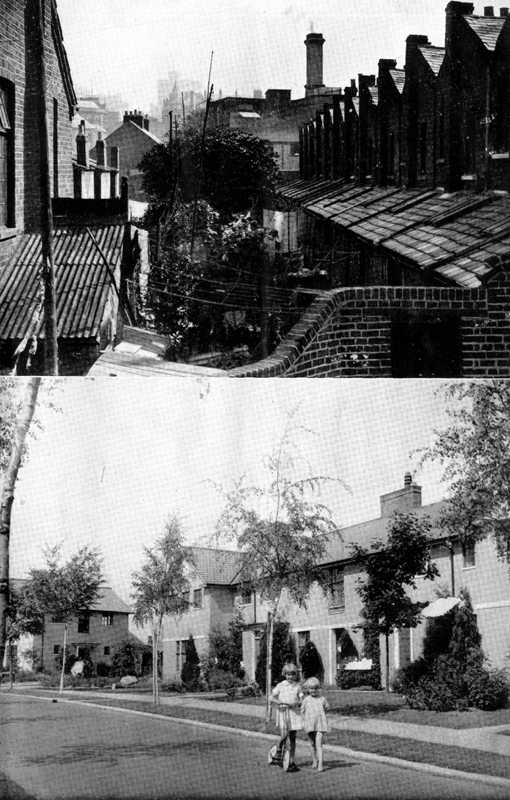
Victoria Cottages, Windsor and houses at Welwyn Garden City.
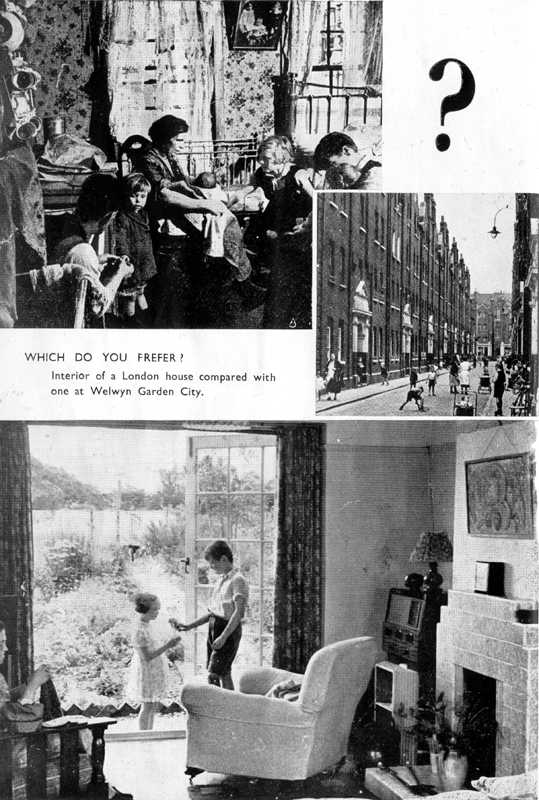
CIVIC AND SOCIAL
CENTRES
From the time of William the Conqueror until the 19th century Windsor consisted of a mere handful of houses and shops huddled around the Castle walls. Its centre was High Street, complete with gallows and stocks. But after the coming of the railway it expanded rapidly to the south and west, gradually growing to be what we understand by the word 'town.'
With this growth, however, the civic administration has not kept pace. At the present time the Town Council meets at the Guildhall, the Town Clerk and the Borough Accountant are housed in Park Street in buildings unsuited to their purpose, and the Borough Engineer and the Sanitary Inspector are a mile away in Alma Road in buildings similarly unsatisfactory. The Education Offices in Victoria Street are old and very nearly worn out, and other administrative departments are scattered in odd corners of the town, usually in converted houses.
